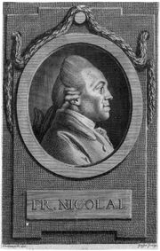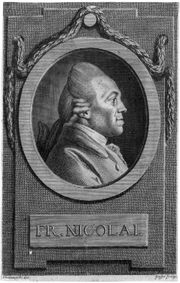
Christoph Friedrich Nicolai
Encyclopedia

Germany
Germany , officially the Federal Republic of Germany , is a federal parliamentary republic in Europe. The country consists of 16 states while the capital and largest city is Berlin. Germany covers an area of 357,021 km2 and has a largely temperate seasonal climate...
writer
Writer
A writer is a person who produces literature, such as novels, short stories, plays, screenplays, poetry, or other literary art. Skilled writers are able to use language to portray ideas and images....
and bookseller.
Nicolai was born in Berlin
Berlin
Berlin is the capital city of Germany and is one of the 16 states of Germany. With a population of 3.45 million people, Berlin is Germany's largest city. It is the second most populous city proper and the seventh most populous urban area in the European Union...
, where his father, Christoph Gottlieb Nicolai (d. 1752), was the founder of the famous Nicolaische Buchhandlung. He received a good education, and in 1749 went to Frankfurt (Oder)
Frankfurt (Oder)
Frankfurt is a town in Brandenburg, Germany, located on the Oder River, on the German-Polish border directly opposite the town of Słubice which was a part of Frankfurt until 1945. At the end of the 1980s it reached a population peak with more than 87,000 inhabitants...
to learn his father's business, finding time also to become acquainted with English literature
English literature
English literature is the literature written in the English language, including literature composed in English by writers not necessarily from England; for example, Robert Burns was Scottish, James Joyce was Irish, Joseph Conrad was Polish, Dylan Thomas was Welsh, Edgar Allan Poe was American, J....
.
In 1752 Nicolai returned to Berlin, and began to take part in literary controversy by defending John Milton
John Milton
John Milton was an English poet, polemicist, a scholarly man of letters, and a civil servant for the Commonwealth of England under Oliver Cromwell...
against the attacks of JC Gottsched
Johann Christoph Gottsched
Johann Christoph Gottsched was a German author and critic.-Biography:He was born at Juditten near Königsberg, Brandenburg-Prussia, the son of a Lutheran clergyman...
. His Briefe über den jetzigen Zustand der schönen Wissenschaften in Deutschland, published anonymously in 1755 and reprinted by G Ellinger in 1894, were directed against both Gottsched and Gottsched's Swiss opponents, Johann Jakob Bodmer
Johann Jakob Bodmer
Johann Jakob Bodmer was a Swiss-German author, academic, critic and poet.-Life:Born at Greifensee, near Zürich, and first studying theology and then trying a commercial career, he finally found his vocation in letters...
and Johann Jakob Breitinger
Johann Jakob Breitinger
Johann Jakob Breitinger was a Swiss philologist and author.- Life :Breitinger studied theology and philology and first earned recognition from 1730 through a new edition of the Septuaginta. From 1731 he worked as Professor of Hebrew and later of Greek in the gymnasium in Zürich...
; his enthusiasm for English literature won for him the friendship of Gotthold Ephraim Lessing
Gotthold Ephraim Lessing
Gotthold Ephraim Lessing was a German writer, philosopher, dramatist, publicist, and art critic, and one of the most outstanding representatives of the Enlightenment era. His plays and theoretical writings substantially influenced the development of German literature...
and Moses Mendelssohn
Moses Mendelssohn
Moses Mendelssohn was a German Jewish philosopher to whose ideas the renaissance of European Jews, Haskalah is indebted...
. In association with Mendelssohn he established in 1757 the Bibliothek der schonen Wissenschaften, a periodical which he conducted until 1760. Together with Lessing and Mendelssohn, Nicolai edited the famous Briefe, die neueste Literatur betreffend between 1759 and 1765; and from 1765 to 1792 he edited the Allgemeine deutsche Bibliothek. This latter periodical served as the organ of the so-called popular philosophers, who warred against authority in religion and against what they conceived to be extravagance in literature.
The new movement of ideas represented by Herder
Johann Gottfried Herder
Johann Gottfried von Herder was a German philosopher, theologian, poet, and literary critic. He is associated with the periods of Enlightenment, Sturm und Drang, and Weimar Classicism.-Biography:...
, Goethe
Johann Wolfgang von Goethe
Johann Wolfgang von Goethe was a German writer, pictorial artist, biologist, theoretical physicist, and polymath. He is considered the supreme genius of modern German literature. His works span the fields of poetry, drama, prose, philosophy, and science. His Faust has been called the greatest long...
, Schiller
Friedrich Schiller
Johann Christoph Friedrich von Schiller was a German poet, philosopher, historian, and playwright. During the last seventeen years of his life , Schiller struck up a productive, if complicated, friendship with already famous and influential Johann Wolfgang von Goethe...
, Kant
Immanuel Kant
Immanuel Kant was a German philosopher from Königsberg , researching, lecturing and writing on philosophy and anthropology at the end of the 18th Century Enlightenment....
and Fichte
Johann Gottlieb Fichte
Johann Gottlieb Fichte was a German philosopher. He was one of the founding figures of the philosophical movement known as German idealism, a movement that developed from the theoretical and ethical writings of Immanuel Kant...
, Nicolai was incapable of understanding, and he made himself ridiculous by foolish misrepresentation of the aims of these writers. Of Nicolai's independent works, perhaps the only one which has some historical value is his Anekdoten von Friedrich II (1788-1792). His romances are forgotten, although Das Leben und die Meinungen des Herrn Magister Sebaldus Nothanker (1773-1776), and his satire on Goethe's Werther
The Sorrows of Young Werther
The Sorrows of Young Werther is an epistolary and loosely autobiographical novel by Johann Wolfgang von Goethe, first published in 1774; a revised edition of the novel was published in 1787...
, Freuden des jungen Werthers (1775), had a certain reputation in their day. Between 1788 and 1796, Nicolai published in twelve volumes a Beschreibung einer Reise durch Deutschland und die Schweiz, which bears witness to the narrow conservatism of his views in later life. He died in Berlin.
Nicolai's Bildniss und Selbsbiographie was published by Moses Samuel Löwe in the Bildnisse jetzt lebender Berliner Gelehrter, in 1806. See also:
- Leopold F. von Göcking, Friedrich Nicolais Leben und literarischer Nachlass (1820)
- Jakob Minor, Lessings Jugendfreunde, in Joseph KürschnerJoseph KürschnerJoseph Kürschner was a German author and editor most often cited for his critical edition of classics from German literature.-Biography:...
's Deutsche Nationalliteratur, vol. lxxii. (1883) - Otto Hoffmann, Herders Briefwechsel mit Nicolai (1887)
- Ernst Friedel, Zur Geschichte der Nicolaischen Buchhandlung und des Hauses Brüderstraße 13 in Berlin (1891)
- Ernst Altenkrüger, Friedrich Nicolais Jugendschriften (1894)

